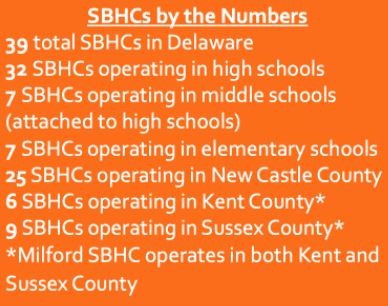The School-Based Health Center Boom Might Soon Be Upon Us
–House Bill 129, introduced by Rep. Kim Williams, would require school-based health centers in all high-needs elementary schools.
-School-based health centers are supported by state dollars and health systems. They provide comprehensive physical, behavioral, and preventive health services delivered by qualified medical and behavioral health providers located in a school setting.
-Health centers have shown a myriad of benefits, from improved student outcomes to cost savings.

Student health and wellness was an emerging topic even before the COVID-19 pandemic hit. Now it’s a top concern for families and education leaders alike.
House Bill 129, introduced by Rep. Kim Williams in state legislature last week, would build on the state’s existing network of school-based health centers by requiring them in all high-needs elementary schools.
What are School-Based Health Centers (SBHCs)?
School-based health centers are nothing like the “nurse’s office” most would imagine when thinking “school + health.” SBHCs, instead, are a health care delivery model that provides students with physical, behavioral, and preventive health services delivered by qualified medical and behavioral health providers located in a school setting. They are:
- Sponsored by a health agency (hospital, medical practice, health center, etc.)
- Different and separate from school nurses and counselors
- Interactive with community providers (pediatricians, therapists, specialists)
- Available to all students regardless of insurance or ability to pay
There are already dozens of SBHCs in Delaware, and for good reason. National studies reveal SBHCs have a positive impact on students’ physical and behavioral health, leading to reduced hospitalizations and even reduced instances of substance abuse.
Critically, services provided by SBHCs help to reduce disparities in health care access and health outcomes. SBHCs have shown a positive impact on student seat time, absenteeism, and grade promotion—while demonstrating significant cost benefits for families and health providers.

SBHCs in other states have been implemented based on student need. Historically, SBHCs in Delaware have been implemented based on student population size.
According to HB129, Delaware will foot the bill on start-up costs for each school-based health center at two high–needs elementary schools per year until each high-needs elementary school has a center. “High–needs” in this case refers to any elementary school in the top quartile of three or more in percentage of low-income students, percentage of English learners, percentage of students with disabilities, percentage of minority students, or having 90 percent of its students classified as low-income, English learners, or minority.
The legislation would also allow high-needs elementary schools that already operate school-based health centers to apply for reimbursement of previously expended funds necessary to establish said health center.
The legislation comes at a time when state leaders are digging deeper into SBHCs. Delaware’s Division of Public Health and the volunteer School Based Health Alliance recently released a SBHC strategic plan to align on goals and assist with state leaders as they look go grow Delaware’s SBHC map—including updates to the systems, policies, and supports SBHCs need to start up, sustain, and improve.
And the timing is right with the arrival of American Rescue Plan Act funds, which can go toward mental health purposes, as well as for capital and operational costs.
Advocates have long called for more school-level support on the student health front. Comprehensive, family-centered medical care is linked to better performance in schools and less risky life behaviors.
The Vision Coalition of Delaware recommended “a broad array of wrap-around services to students (e.g., physical and mental health services)” that “support the holistic development of schools in high-need communities” in its Student Success 2025 report in 2015.
And in 2018, education and health partners collaborated on a landscape analysis of social and emotional supports in Delaware; and recommended expanding school-based health centers, as well as “[building] on existing successful partnerships with organizations that serve families and students by bringing outside resources into schools.”
In Delaware, SBHCs are operated under statutory regulations 18 Del. C. §3365 and 3517G. Funding sources include:
- State funding
- Medicaid reimbursement
- Commercial insurance reimbursement
- In-kind support from schools and medical sponsors
SBHC services vary by site and include:
- Preventive care
- Treatment of minor, acute conditions
- Mental health and substance use screenings
- Counseling
- Testing and treatment for sexually-transmitted infections
- Reproductive health
- Nutrition counseling
- Health promotion education
- Referrals to community providers
- Insurance and social service navigation
Related Topics: Delaware education, legislation, school based wellness centers, student health, wellness centers